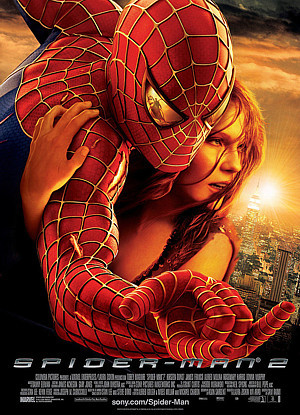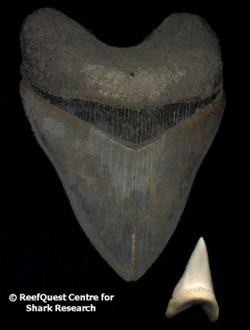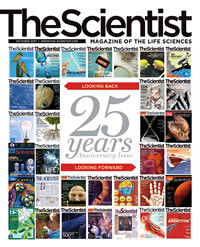SPOILERS AHEAD
!!!SCIENCE MOMENT!!!
BEWARE THE SCIENCE OF THESE TITLES FROM THE
2000s
| 1950s - 1960s - 1970s - 1980s - 1990s - 2000s | ||
| 2000
to 2002 2003 to 2004 2005 to 2006 2007 to 2008 |
||
| EUREKA! 33 MOMENTS OF SCIENCE AND COUNTING! | ||

I have no problem with almost everything here. Who knows, maybe some odd side effect to toxic waste could produce a good mutation instead of the much more likely bad ones. The only genuine mistake involves the Daredevil's ability to dodge bullets because he hears them coming. I'm sorry, but no. Bullets travel faster than the speed of sound. They would arrive at your skull before the sound got to your ear. |

I want to say something about physics and biology (which, like all sciences, is a mere subset of physics). Biology first. Narration and conversation at several points make references to mutants being the next "stage" in evolution and they compare their situation with the “conflict” between Neanderthals and Cro-Magnons. Both points of view are inaccuracies based on the common misconception that evolution is some mysterious force driving life toward greater intelligence and that we (and now mutants) are the pinnacles of that achievement. In fact, evolution could care less how smart you are. All evolution cares about is how good you are at reproducing. If being dumber helped, then each generation of dumber people would produce more offspring until the human species was gradually replaced by a less intelligent breed (Hey, wait a minute…). Thus, being able to freeze things like Iceman does is great fun but if it doesn't help you get a date or support your offspring to make sure they survive long enough to breed, then evolution doesn’t apply. And the Neanderthal / Cro-Magnon situation is spurious as well. When modern humans entered Europe 30,000 years ago the Neanderthal had been living there already for at least 100,000 years. Within 5,000 years of our arrival the Neanderthal were gone. This wasn't a war or anything – we simply out bred them. We were better able to compete for resources (because we were smarter, but that part's still disputed) and generation by generation they declined and we increased. The situation in the movie doesn't fit the details very well. And now the physics. The fact is the powers possessed by these mutants clearly violates one of the most hallowed rules of science: The Conservation of Mass and Energy (neither mass nor energy can be created or destroyed – merely change form). In other words, where does the energy come from for Jean Grey’s telekinesis or Storm’s movement of huge masses of air? Are these things impossible? No. But you have to assume that the basis for all mutant power is the ability to tap into some unknown energy source. What it is and what dimension it exists in is a mystery but if you assume its existence you can explain everything else. |
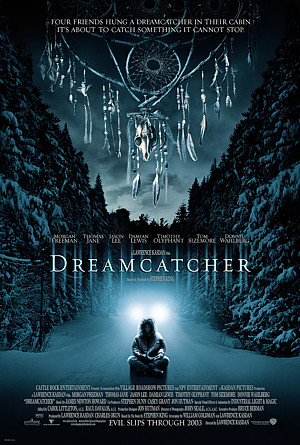
If you had advanced space travel and the kind of quick spreading fungus / bio-weapon shown here, it would be a simple matter to seed the upper atmosphere with it and rain it down all over the Earth (a-la INVASION OF THE BODY SNATCHERS - Feo). The conquest these aliens seem bent on would happen quickly and without firing a shot. Proof, perhaps, that just because someone comes from a culture with more advanced technology doesn't mean they’re automatically very smart. |
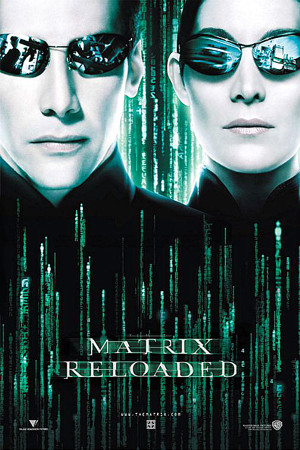
I was pleased to see no attempt to add to the ridiculous idea mentioned in the first film that the machines are using their unwitting human slaves as a power source. That's just plain stupid for a long list of reasons and they wisely skipped over it here. On the other hand a lot of the computer references are as ancient as Tron. The story centers around a plan to get into the enemy “mainframe”, an idea right out of the 70’s. Have these artificial intelligence programs not heard of distributed networks? Like, for example, the Internet? The Internet has no “central” computer, nor does it need one. I find it hard to believe that these vastly more advanced computers would take such a giant step backwards. |
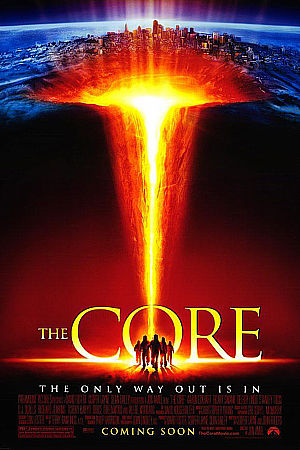
Now, I'm not going to discuss the magical underground drillship. A half-crazy lone scientist inventing something essentially impossible is a staple of science fiction so that's fine. But I do have a problem when the movie makes scientific sounding statements that are just plain wrong. Here are the high points: 1. If there really were "solar microwaves" being held off by the Earth's magnetic field, why didn't they cook the Apollo astronauts when they ventured beyond the field's coverage? Why isn't Mars being cooked, since it hasn't got much of a field? The answer is that the sun doesn't produce much in the way of microwaves and that what it does produce isn't stopped by our magnetic field anyway. A magnetic field can only affect the paths of charged particles like protons and electrons. It has no effect at all on electromagnetic radiation like microwaves or visible light or ultraviolet light. It's our atmosphere – not our magnetic field – that filters out the harmful parts of the sun's radiative output. 2. The inner core of the Earth is a ball of crystalline iron about 2400 kilometers in diameter. A good way to get a feel for how much energy would actually be required to get it spinning again if it stopped can be found from calculating the rotational energy it has right now. This is the rotational equivalent of kinetic energy: the energy of motion. Plugging in the numbers reveals that the inner core has a rotational energy of 385 trillion trillion joules. That's equivalent to 96 billion megatons of TNT, so the mere 1000 megatons worth of nukes they bring along is about 100 million times too small. 3. Many times in the Earth's past the magnetic field has reversed its polarity, making the south pole the north pole and vice versa. During these field reversals (just the field flips – not the Earth itself) there are intervals of a few thousand years where the field collapses completely and the Earth has no magnetic field to speak of. None of these incidents resulted in the Earth being cooked by microwaves, and the fossil record doesn't show any evidence of mass extinctions during these times. The biosphere survived just fine. 4. An overlooked effect has to do with gravity. The deeper you penetrated into the Earth, the less Earth there'd be below you and thus the less of a gravitational pull you'd feel. 5. If you have a bomb, and you put a pile of explosives next to it, that will make the total explosion bigger. However if you have a nuclear bomb and you put a pile of plutonium next to it, that will only be a waste of plutonium. Nukes just don't work that way. UPDATE: Sep. 16, 2013 — Scientists at the University of Leeds have solved a 300-year-old riddle about which direction the centre of Earth spins. |

EUREKA! At first I thought the fast acting nature of the infection was a bit contrived but the more I thought about this, the easier it turns out to be. Consider that there are many drugs (and poisons) that can have an almost immediate effect upon reaching your blood stream. Now imagine such a fast-acting drug that turns you into an enraged monster (maybe a variation on PCP). It is probably within our technological ability to genetically engineer an existing bacterium to manufacture this drug. Now put it all together. A blood-infecting bacteria strain that makes the rage drug as soon as it hits your blood stream. Infected blood splashes your face during a struggle and the bacteria is in through your mucous membranes. Suddenly you want to kill, kill, KILL! We could probably do it. |

EUREKA! The monster in this monster movie is a member of the Streptococcus family, but you may know it better as the flesh eating bacteria. It's quite rare but when it does happen it usually enters the body through a cut or other injury. Once in the blood stream it infects the muscles and fat just beneath the skin and produces toxins that dissolve the flesh in a process called necrotizing fasciitis (be careful if you google those words, by the way, because you'll probably end up seeing some of the grossest medical photos ever taken). This is a life threatening infection and treatment usually involves immediate amputation of infected body parts. And yes, the movie mostly gets the details right. This infection really isn't very communicable (unless an infected bleeds into some else’s open wound) but these kids ain't exactly rocket scientists so their ignorance (and terror about getting "the disease") is very believable. And the way they get infected is basically believable, although it requires some criminal negligence. |
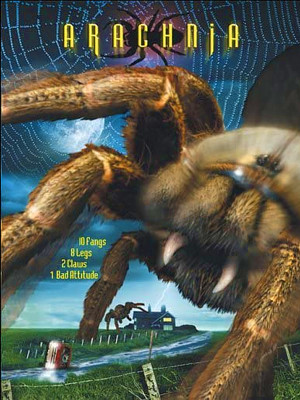
EUREKA! Giant spiders violate the square-cube law in the sense that spiders as big as horses wouldn't be able to support their own weight and would have a long list of internal problems like not being able to absorb enough oxygen to survive. But when the snooty professor is first told about (but hasn't yet seen) the big spiders, he snootily points out exactly those facts! Later, when we learn that the giant spiders are some unknown underground species, all that's left for me or the snooty professor to say is that it's really unlikely but not impossible. |
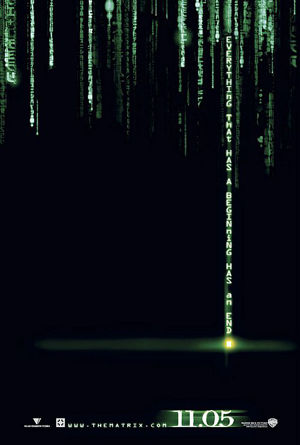
There is a very brief scene where a ship piloted by the good guys gets above ground and then, just for a moment, above the perpetual cloud cover. Trinity sees the sun for real, probably for the first time in her life. The sunny, beautiful world above the clouds is a huge contrast to the grim horror below. But it's also more proof that the whole "using people as batteries" idea (that's what we are told the machines are using people for: electricity) is stupid. Totally aside from the simple fact that burning the food you're feeding these people would provide more power than you'd ever get from their body heat (humans are poor heat engines), just a few miles up you've got as much solar energy as you want. The tech these machines have is plenty for solar cell covered blimps or solar power satellites. I don't know what they're using people for, but it ain't electricity. |

There is a scene where we discover that Nemo's great submarine is solar powered. Yeah, you heard me. Now that's not quite as stupid as it seems because they mention this when the sub is on the surface, charging its batteries with solar energy. But why would Hollywood writers choose solar power when (nuclear) there is a much more (nuclear) obvious choice (nuclear) that the U.S. Navy has been (nuclear) using for many decades (nuclear)? Who can say? My guess is that solar energy, while perhaps not the most obvious choice as a submarine power source, was the most politically correct choice. And by the way: in the original Jules Verne story Nemo's sub was powered by extracting electrolytes from the water. That wouldn't work but it still makes more sense than a solar powered submarine. |
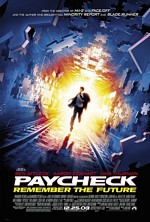
The idea of any kind of "memory marker" artificially set in the brain is something I'm pretty sure wouldn't work, given that memories are stored holographically rather than linearly but maybe they learned a way around that. I have to be careful because I don't want to ruin the surprise of what Michael was working on. All I'll say is that although current thinking on the topic would not allow the idea in question to work, the whole subject is sufficiently in flux that I'm fine with a future discovery making it workable. |

There are a lot of violations of basic physics here (like if a multi-ton creature can leap miles into the air then by virtue of equal-and-opposite-reaction he should kick a huge crater into the ground with each leap), but the most blatant is the transformation itself. If an average-sized man triples in height then according to the square-cube law his weight will be three cubed or 27 times greater. That means he goes from 200 pounds to 5400 pounds (more than 2 and a half tons!). Where does that mass come from? Not from "accelerated cell growth" because cells don't just appear from nowhere. To gain 5200 pounds you'd have to eat more than 5200 pounds of food and let your body process that raw material INTO more cells. That's not what happens here. The mass just magically appears (and then disappears when he changes back), a clear violation of Conservation of Mass and Energy. Only magic can do that so this is fantasy, not sci-fi. |

There is a standard plot device in thrillers involving turning on the gas on a stove and either leaving a candle burning or waiting for someone to light a match and thereby blow up a house in a huge fireball. Very dramatic and it would sort of work. It's just that it would take hours for the house to fill with gas this way, not the mere minutes that's usually shown. |

I say frustrating because, since the movie never explains what happened, there's no science for me to analyze. If I had to guess I'd say some kind of terrorist-released plague was the culprit but the fact is it could be a lot of different things. Civilization is surprisingly fragile. |

One of the very cool things about the original three movies is that, in spite of a lot of scientific hand waving, they never figure out exactly why this is happening. A virus? A vengeful God? Alien Space Bats? It just happens and people have to deal with it. The remake takes the same approach but it does give a slight nod in the "virus" direction. I wasn't happy about that because there's no freakin'; way a virus could reanimate a dead body. Think about it. A typical zombie is wandering around for months or years, never eating or drinking. No respiration, no heartbeat, and yet they can move. They don't heal but they also don't decay (if they did they'd be bloated, liquefying messes in days). Something is animating them, maintaining their body in its present state, and providing enough biochemical energy for them to move around. I have no idea what could do that but it sure as hell isn't a virus. UPDATE: Kelly Parks answers, "Oh, yeah. That's right." Feo Amante says, "Well so much for THIS freaking Science Moment!" |

Is there really such a thing as a "Butterfly Effect"? Yep, and this movie adheres pretty well to the scientific analogy. But the Butterfly Effect, a term coined by Jacques Hadamard in 1890, is just that: an analogy used to desribe how very small things can have enormous outcomes over periods of time. It's not now, nor was it ever a theory or even a hypothesis. The Butterfly Effect is also known as the Ripple Effect and it was never meant to suggest that a butterfly flapping its wings in one part of the world, could possibly create a storm elsewhere in the world. Want to know more? Damn right you do! Continued at !!!THE SCIENCE MOMENT!!!/The Butterfly Effect. |
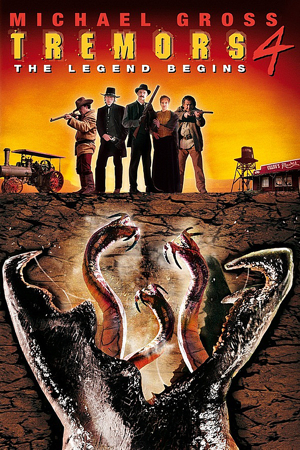
Hiram and Juan find the imprints of what they assume were buried eggs near a creek. From this they jump to the conclusion that these creatures must have been long buried and that the creek uncovered them and caused them to hatch. The problem is that in TREMORS 2 we were told that the graboids are “Precambrian life forms”, which means the eggs have been sitting there for half a billion years. And still fresh? I’ll concede that it’s not completely impossible but damn! |
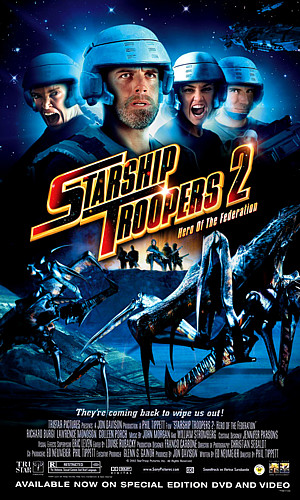
This science moment involves a personal experience connected to this movie. I was at the 2002 San Diego Comic Con and, while wandering around one day, I came across a panel discussion about STARSHIP TROOPERS 2. Actress Brenda Strong, director Phil Tippett and writer Ed Neumeier (and one of the producers, I think) were all there promoting the movie and taking questions from the audience. So I took the opportunity to ask (as diplomatically as I could manage) why the first movie did such a terrible job getting the science right, especially considering that it was based on a Robert Heinlein novel and Heinlein was one of the first "hard core" science fiction writers who always made a serious effort to get the scientific details correct. The reaction? Confusion. They looked at each other and back at me and clearly didn't understand what I was talking about. They thought the science was fine. Which explains a lot about these movies and about Hollywood in general. |
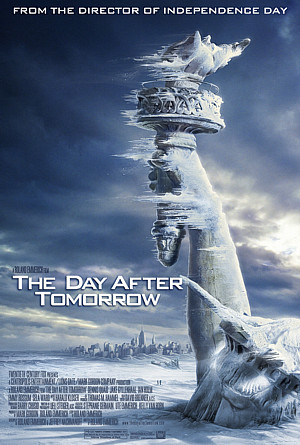
We'll start with the two important questions you must answer when you talk about global warming: 1. Is the Earth getting warmer? 2. If so, why is it getting warmer? The problem is most people assume that if the answer is yes to the first question then the only possible answer to the second question is "we are causing the warming by pumping carbon dioxide into the atmosphere." This is what is technically known as "jumping to conclusions." Want to know more? Damn right you do! Continued at !!!SCIENCE MOMENT!!! THE DAY AFTER TOMORROW. |
|
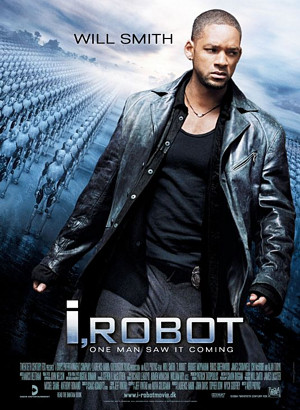
My only complaint is that the movie doesn't really make clear what a different world it would be if intelligent robots were everywhere. There is brief mention of people losing their jobs to robots, which would certainly happen. But think about the effect on the economy if the cost of labor was effectively zero. Every product imaginable would become dirt cheap, effectively making us all millionaires. And the fast pace of scientific discovery we have now would seem glacial compared to an era when smart machines are designing even smarter machines. Some people call this rapidly approaching moment "The Singularity", because once it happens knowledge expands so fast that it's impossible for us to imagine what it would be like. |

Today the subject is social science and although I am far from a qualified social scientist, I'm going to make a prediction. There will be more and more movies made about crime and social breakdown in France in the years ahead. And the tone of the movies will change from sympathetic to the rioters (like this one) to decidedly unsympathetic as things get worse. And that's all I'm going to say about that. |
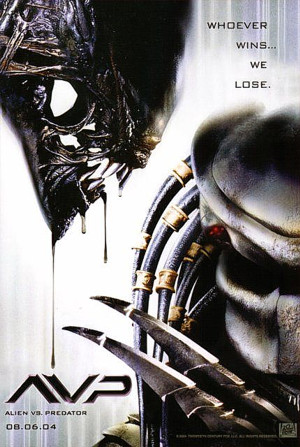
The science in question is geography. The "island near Antarctica" is called Bovetoya. This is a real island and is listed in the Guinness Book of World Records as the most isolated island (bare volcanic rock covered with glaciers and rarely visited by anyone) on Earth. But it's only "near" Antarctica if you think 1000 miles away is "near". The tip of South America is closer to Antarctica than Bovetoya. |
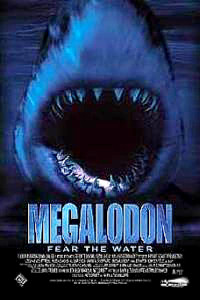
The Megalodon (which means "big tooth") is related to the Great White shark but it was quite a bit bigger: anywhere from 60 to 80 feet long. The movie implies that the giant underground cave containing the shark had been sealed for 65 million years (the end of the Cretaceous). This was unnecessary because Megalodons went extinct much more recently, probably within that last couple of million years (there are stories about Megalodon teeth that have been found and that may be only 10,000 years old!). And speaking of the underground cave: this idea has shown up before (DEEPSTAR SIX, for example) but isn't very workable. There is life in the deep ocean but that ecology depends on the steady rain of organic material from near the surface. A cave would be cut off from this mana from heaven and it's hard to imagine enough life going on to support a population of very large predators.
|

EUREKA! The one thing I liked about this movie (the one and ONLY thing) was how they explained the big snakes. The biggest anaconda ever measured was 28 feet long and the smallest of these monsters is easily twice that. But it is true, as the movie points out, that reptiles grow their whole lives so the older they get, the bigger they get. Which means if the local environment included an immortality-granting blood orchid as part of the food chain then some of the wildlife might live long enough to get really big. |
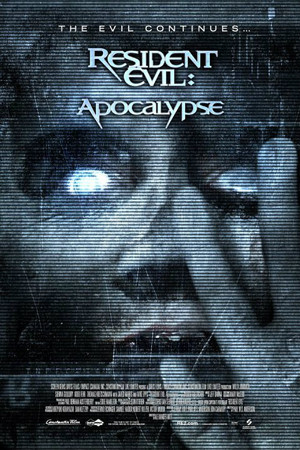
Part of the storyline is that Umbrella, the cartoonishly evil corporation, plans to sanitize the infection in Raccoon City with a nuke. Then to avoid awkward questions about where they got a nuke and why they're blowing up cities, they plan on saying that the explosion was actually caused by a meltdown at the local nuclear power plant. Which is, of course, impossible. A fission chain reaction requires some very special materials. Specifically you need nearly pure uranium 235 (or plutonium 239, but that's never used in reactors). Naturally occurring uranium is mostly U-238 which is quite useless for fission. Only one atom in 7000 is the 235 isotope and the first thing you have to do to build a nuke is separate the 235 from the 238 until you have better than 95% U-235 ("weapons grade"). Only then can a chain reaction of atoms splitting and releasing neutrons, which split more atoms, be achieved. Nuclear power plants use uranium that has been enriched to about 3% U-235. It's very radioactive and if you surround it with neutron reflecting materials it can get very hot. But it simply can't sustain a chain reaction and it can't produce a nuclear explosion. One other point: You'd think that when Umbrella tried to say the nuclear power plant caused the nuclear explosion, someone would have said, "Really? So an explosion at the power plant on the edge of town created this big crater in the center of town? Are you sure you want to go with that story?" |

EUREKA! A very short science moment because I can't say much without spoiling a surprise or two. So all I will say is to mention one of Clarke's Laws: "A sufficiently advanced technology will be indistinguishable from magic." |
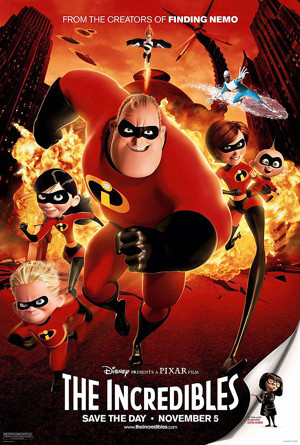
EUREKA! There are usually two schools of thought regarding superheroes and science. The first is to analyze their abilities based on known physics and point out all the various impossibilities, most of which boil down to violations of the Law of Conservation of energy. The other school of thought states that superheroes are fantasy and therefore it's a mistake to use a scientific point of view just as it would be a mistake to analyze the science in Lord of the Rings. There is a third path. I found it in the Robert Heinlein story "Waldo", where the inventor / scientist Waldo Jones is faced with proof of the existence of Magic. Rather than having his worldview and his mind crumble (as happens to another character in the story) Waldo simply guesses that an undiscovered energy source (probably extra-dimensional) is being tapped into and leaves it at that. We don't know everything yet, after all. This neatly and empirically explains all superheroes-who-violate-physics-especially-Conservation-of-Energy. So there. |

One of the defining characteristics of vampires is that their strength and reflexes are far superior to humans. The combination of their speed and great strength is what makes them such deadly predators. Blade has these abilities as well, which is why he can fight vampires hand-to-hand. But Abigail and Hannibal are just ordinary human beings (well, Hannibal had an odd past but he's an ordinary human now). So I don't care how strong their Kung Fu is, they should NOT be able to get in fist fights with vampires. And yet they do, time and again, with no explanation as to how this is possible. As far as regular science is concerned, the movie stretched my suspension of disbelief but didn't break it. I can imagine a virus that alters humans into another species with unusual abilities. But a virus that could do all these things could never evolve on its own. It would have to be artificial. |

Dean says that his reactor uses hydrogen and deuterium and fusion occurs "when these two elements combine". In fact they are the same element. Deuterium (and tritium) are just isotopes of hydrogen. Plain hydrogen (also called protium) is a single proton orbited by a single electron. Deuterium is the same arrangement plus a neutron and tritium is the same plus two neutrons. But they're all hydrogen and are chemically identical. |
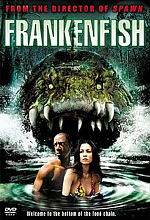
EUREKA! The genetically engineered creature in question actually wasn't that bad. It's big but not violates-the-square-cube-law big and its behavior is way too smart and basically monster overacting but its certainly on a par with the rest of the movie. The fact is that creating monsters like this is either doable today or will be by next Tuesday, depending on how ethical the molecular biologist you ask the question is. |

EUREKA! We find out that these girls aren't just randomly killing guys for fun - they're attempting to mate with them. The fact that the implanted embryos end up immediately killing their male hosts is a disappointment to the girls, but they figure with enough experimentation they'll get it right. Normally, I'd dismiss that as stupid since there isn't a single animal on Earth capable of crossbreeding with humans (and all life on Earth is based on DNA), so the idea of successfully crossbreeding with an alien life form with a completely different evolutionary history and a vastly different biochemistry is astronomically unlikely. Unless, of course, you're from an advanced alien civilization with a good knowledge of exobiology and have done this sort of thing before. Then maybe it would just take some genetic engineering and some unwilling test subjects. |
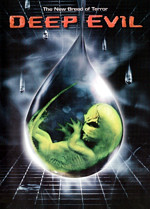
The alien "creature" doesn't quite violate any laws of physics or anything (although the apparent difference in mass between its various forms come close) but I willpoint out that its ability to interface with Earthlings means it could only be artificial. Life may or may not exist throughout the Universe but if it does then each time it appears it will have its own unique biochemistry and its own version of something like DNA. So the idea of life from one planet being able to eat (or mate with) life from another planet is truly unlikely. |
Continue to
| FEO AMANTE'S HORROR THRILLER Created by: E.C.McMullen Jr. FOLLOW ME @ |
| Amazon |
| ECMJr |
| Feo Blog |
| IMDb |
| Stage32 |
| YouTube |
| Zazzle Shop |
Links To The FUTURE! MAN
CONQUERS SPACE BUZZ ALDRIN SCIENCE LINKS! BAD ASTRONOMY CENTER FOR THE STUDY OF SCIENCE FICTION MADSCI.org LINKS TO THE PAST! NASA.gov |


